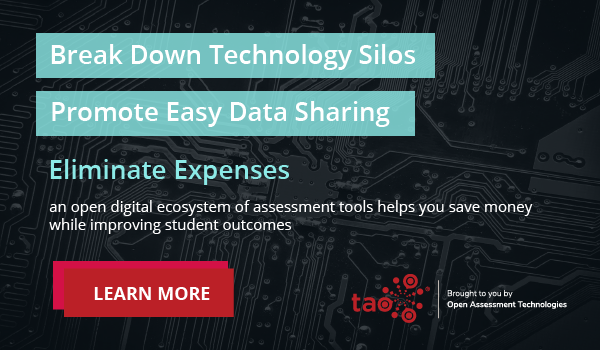Traditionally, schools have built and assessed a variety of academic skills that may or may not have been useful for students after graduation and in the workplace. While academic content skills and knowledge are still important, many teachers and school districts understand that students need more than academic knowledge to succeed outside of school. This has led to a shift from focusing solely on academics to also building 21st-century skills — sometimes referred to as soft skills — that employers look for such as collaboration, critical thinking, and creativity within the class curriculum.
One of the challenges that comes with developing career-readiness in the classroom is in creating assessments that measure these skills. However, technology-based skills assessment tools have made it easier to assess 21st-century skills like collaboration, by capturing performance data that can reveal insight into a student’s approach to problem solving. In doing so, educators can not only help students to grow in content knowledge, but they also can help to ensure that they are ready to hit the ground running once they are done with their formal education.
What Does “Career Readiness” Mean?
Career readiness refers to the acquisition of the skills, knowledge, and attributes that prepare individuals to enter and succeed in the workforce. It goes beyond academic or technical qualifications and encompasses a range of competencies essential for professional success in various fields. Career readiness involves developing a holistic set of skills that enable individuals to navigate the complexities of the modern workplace and contribute effectively to their chosen careers. These skills may include soft-skills or intangible skills such as problem solving, leadership, or adaptability. For students, building these skills in school is an important part of finding a job when school is over.
While schools and school districts can take steps to improve career readiness, it is also important to not that career readiness is an ongoing process that involves continuous learning and adaptation to evolving workplace requirements. Educational institutions, employers, and individuals all play roles in fostering and developing career readiness skills. Career development programs, internships, mentorship, and professional development opportunities contribute to enhancing career readiness.
What Skills are Employers Looking for?
Employers seek a combination of technical skills, soft skills, and specific attributes when evaluating candidates for job positions. The specific skills may vary depending on the industry, job role, and company culture, but here are some general skills and qualities that are commonly sought by employers:
- Communication Skills: Effective verbal and written communication skills. The ability to convey ideas, listen actively, and communicate with diverse audiences.
- Teamwork and Collaboration: Capacity to work collaboratively with others in a team environment.
- Problem-Solving Skills: Analytical and critical thinking skills to identify problems and propose effective solutions. Resourcefulness in addressing challenges and making decisions.
- Adaptability and Flexibility: Ability to adapt to changing circumstances and thrive in dynamic work environments.
- Leadership Skills: Leadership qualities, including the ability to motivate and inspire others.
- Initiative and Proactivity: Taking the initiative to tackle tasks and solve problems without constant supervision.
- Time Management: Effective time management skills to prioritize tasks, meet deadlines, and manage workload efficiently. This also means having organizational skills to maintain order and structure in work responsibilities.
- Digital Literacy: Proficiency in using digital tools, software, and technologies relevant to the job. Adaptability to new technologies and the ability to learn and apply them quickly.
- Interpersonal Skills: Strong interpersonal skills, including the ability to build and maintain positive relationships with colleagues, clients, and stakeholders. Emotional intelligence and the ability to navigate workplace relationships.
For educators, building and assessing these skills is critical, career-ready students can tackle challenges and adapt to different situations. In the classroom, students can be given the freedom to explore and learn using career-ready skills while being allowed to make mistakes and grow during the process. This is why it is so important for schools and educators to work on these skills within the classroom.
Both building and assessing career-ready skills are made easier using technology. Online learning platforms and skills assessment tools allow educators to deliver adaptable and personalized learning materials to students which gives them the ability to move at their own pace. These career-ready skills can be embedded within existing content to allow students to grow academically while improving career readiness.
Building Career-Ready Skills in the Classroom
Building career-ready skills in the classroom involves a combination of intentional curriculum design, experiential learning opportunities, and fostering a supportive learning environment. Explicitly addressing 21st-century skills such as communication, collaboration, and problem solvinng within the curriculum is essential. Assignments that require group collaboration, presentations, and interpersonal communication help students hone these skills.
Educators can also design learning opportunities that require big-picture thinking. For example, rather than simply teaching a concept in isolation, teachers can develop learning opportunities that require students to think holistically, through an interdisciplinary lens. When building career-ready skills it is important to give students the autonomy to explore and make mistakes along the way. By giving students flexibility and freedom in the learning process they can develop career-ready skills such as perseverance and flexibility.
Assessing Career-Readiness
Another key element to building career-ready skills in the classroom is assessing those skills. This can be challenging because questions addressing career-ready skills may need to be worked into a traditional test, quiz, or essay, and are typically difficult to measure on paper. However, there are some ways that educators can assess career readiness through their content lesson plans. Here are 6 ways that teachers can assess career-ready skills in the classroom:
- Formative assessments: Formative assessments are assessments used to gauge progress towards a standard and to inform future lessons for the teacher. They are also a great way to measure career readiness skills by seeing how students adapt and make changes after receiving feedback.
- Gamification: By turning learning into a game, students are afforded the opportunity to strive for learning through real-world simulations and trial and error. Teachers can observe how a student works through problem solving and critical thinking when faced with challenging or new situations.
- Collaboration: Teamwork and collaboration are two of the most sought after career readiness skills that employers are looking for. While having students work together to solve problems or to create solutions, educators can assess skills such as leadership, communication, and teamwork.
- Interdisciplinary assessments: Developing assessments that work in a cross-curricular fashion allows educators to assess how students can take information from one area and apply it in another. Providing opportunities for this gives educators a chance to gauge how well students can do this.
- Critical thinking: Giving students assessments that test for critical thinking skills can allow educators to see how well a student can reason and think through a given situation. When the focus goes beyond basic knowledge and into application and deep thinking educators can assess how well students can apply learning to reason through challenging situations.
- Technology integration: At the forefront of all career readiness is the integration of technology. Students need to be able to use technology to collect, interpret, and present information. Teachers can give students time with new technology while also assessing how well students can implement technology for a desired purpose.
For all of the 6 skills listed above, technology can make the teacher’s life easier. Online learning and assessment platforms can give teachers the ability to design complex or even gamified learning experiences for students. Technology-based skill assessment tools also allow educators to ensure deliver a highly adaptable curriculum designed to get students to think critically, work together, and design holistic solutions.
The Bottom Line
Students need to develop career-ready skills so that they can be successful in whatever path they choose after graduation. Developing these skills can be challenging, however, by using technology and online skill assessment tools such as those provided through TAO, educators can build assessments with career readiness in mind. By intentionally building and assessing career-ready skills, educators can identify areas of strength and areas of growth and push students to improve.
Building and assessing career readiness is made easier with technology. Technology and online learning and assessment platforms, like TAO, allow teachers to build flexible and individualized assessments that target students’ needs while assessing career readiness. Developing and assessing career-ready skills is all about giving students the best opportunity for success outside of school when students have an opportunity to learn and make mistakes in the classroom they leave more prepared for a career when they leave school.


